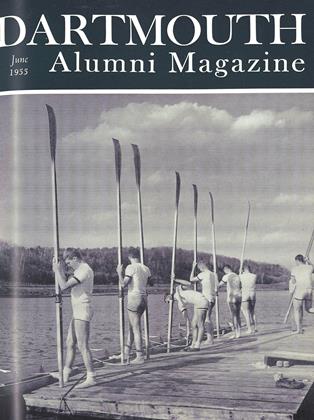SOMERSET MAUGHAM, now that he has given up fiction writing, has turned to literary criticism. In a book called The Art of Fiction (Doubleday, 1955) he has written of ten novels and their authors. The novels you may guess when I list for you the authors dealt with: Henry Fielding, Jane Austen, Stendhal, Balzac, Dickens, Flaubert, Melville, Emily Bronte, Dostoevsky, and Tolstoy. These chapters appeared in the London Times, if I remember correctly, and in a shorter version came out here as a collection of prefaces called Great Novelists and TheirNovels. Everything that Maugham has to say makes sense; he writes with great competence, and this book will delight all Maugham devotees and other readers as well. If these chapters turn you to a first or second reading of the novels in question, the book will more than justify itself.
Robert Ruark, a successful if rather obvious columnist (see his remarks years ago on Henry Miller), has spent much time in Africa during the last four years. He shot big game and has told of this in a non-fiction book, Horn of the Hunter; and now he has turned to a more ambitious theme and has written a long, 566-page novel which was the May choice of the Book-of-the-Month Club. (To him who hath it shall be given.) This novel, Something of Value, is a story about the blacks and the whites in Africa. The setting is Kenya, and the book tells of people involved on both sides of the Mau Mau uprising. Mr. Ruark has been able to convey to his readers something of the "feel" of Africa, not in the masterful way Conrad did in The Heart of Darkness, but at least as a good reporter should. The problems of Africa transcend the local scene, and this Mr. Ruark has succeeded in conveying. Well worth reading.
The third of the Mainstream of America Series is Bruce Lancaster's From Lexington to Liberty, a one-volume story of the American Revolution. Mr. Lancaster learned his trade by writing historical novels which makes this book the easier to read. In brief, this volume upholds the high standards set by Mr. Holbrook's and Mr. Wellman's books. These, if you have forgotten, were The Age of the Moguls and Glory, God and Gold. There are endpaper maps, and a good index. This book will stir you to a better understanding of historical Americanism.
Howard Swiggett has followed up his life of George Washington, The GreatMan, with a study.of some of the forgotten leaders of the Revolution. These "forgotten" men include Jeremiah Wadsworth, John Jay, Livingston, Robert Morris, Edmund Randolph, Horatio Gates, Elbridge Gerry, Aaron Burr (surely not forgotten), and the Pinckney brothers of South Carolina. This book is for those, and I am one, who enjoy reading superficial biography and history.
A few weeks ago in St. Paul I came across a book which would interest most lovers of tennis. This book, Match Playand the Spin of the Ball, is by the late William T. Tilden 11, and is edited by Stephen Wallis Merrihew, who concludes the book with a sketch of Tilden's great career up to 1925, when this book was published.
Tilden was probably the greatest tennis player of all time, and this book brings to life one of our greatest ages in sport. It contains much of the tennis wisdom of the old master whose like "we may never see again. This book will cause nostalgia among all tennis oldsters like myself, even for its illustrations alone.
A pleasant writer and artist combination, Jean Fritz and Marc Simont, have turned out an amusing child's book, called Fish Head, about a scratched-up, patched-up, proud, waterfront cat, who "did just what he liked to do," thus differentiating himself from most of us humans. The publisher is Coward-McCann.
Be on the lookout for the following Anchor Books: Charles Montagu Doughty's Travels in Arabia Deserta, sensibly abridged by my old friend, the late Edward Garnett; Ernst Cassirer's The Mythof the State; Gilbert Murray's Five Stagesof Greek Religion; and John Brebner's excellent The Explorers of North America1492-1806.
Adios until fall.
 View Full Issue
View Full Issue
More From This Issue
-
 Feature
Feature"The Real Business"
June 1955 -
 Feature
FeatureTIMOTHY WAS BEFORE YOU
June 1955 By DANIEL CHASE '14 -
 Feature
FeatureOPERATION BOOTSTRAP
June 1955 By FRANK PEMBERTON -
 Article
ArticleStudent Report
June 1955 -
 Class Notes
Class Notes1918
June 1955 By ERNEST H. EARLEY, RICHARD A. HOLTON -
 Class Notes
Class Notes1923
June 1955 By CHESLEY T. BIXBY, THEODORE D. SHAPLEIGH
HERBERT F. WEST '22
-
 Article
ArticleHanover Browsing
January 1943 By HERBERT F. WEST '22 -
 Article
ArticleCollege Book Seller
April 1950 By HERBERT F. WEST '22 -
 Article
ArticleHanover Browsing
January 1951 By HERBERT F. WEST '22 -
 Books
BooksAMERICAN LITERATURE FOR COLLEGES.
May 1954 By HERBERT F. WEST '22 -
 Article
ArticleHanover Browsing
January 1957 By HERBERT F. WEST '22 -
 Books
BooksLION AMONG ROSES: A MEMOIR OF FINLAND.
APRIL 1965 By HERBERT F. WEST '22








